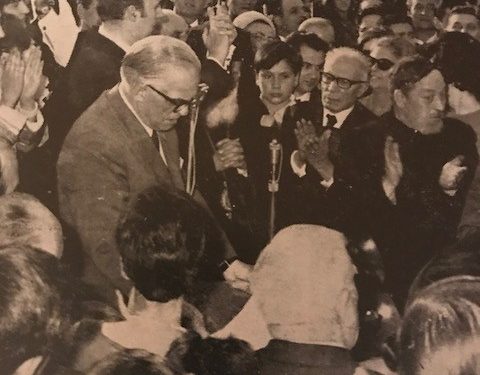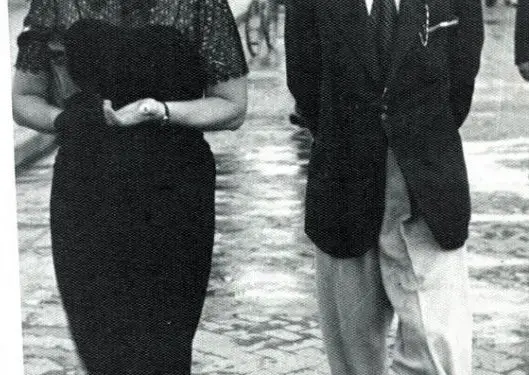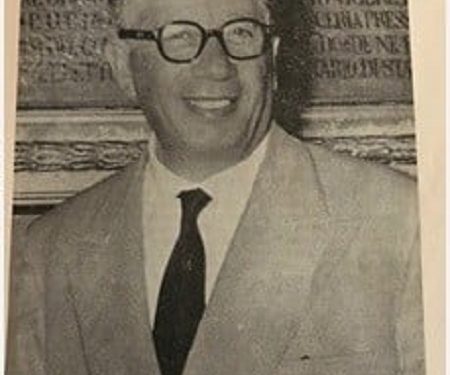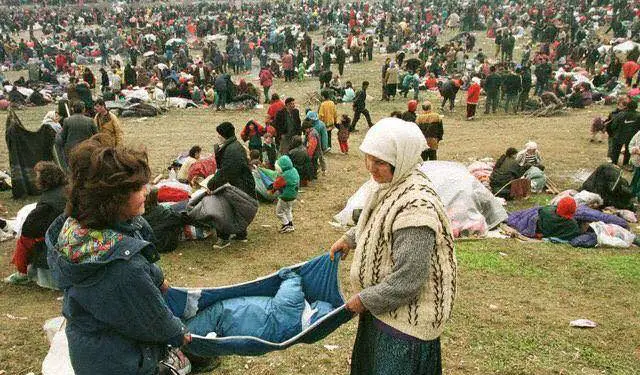Dashnor Kaloçi
Memorie.al publishes the unknown story of the Petrota family of Arbëresh origin, where one of its suckers, Rosolino Petrota, graduated from the Faculty of Medicine of the University of Palermo in Dermatology in 1920, who after initially serving as an assistant at the hospital ” San Saverio “, began his career at the National Bank of Accidents in Italy (today INAIL) where he was entrusted with the medical direction for the region of Sicily-Calabria and in 1937, at the request of King Zog he came to the country of origin together with his family (wife and son Salvatoren) and settled in Tirana, where they stayed until 1947, when after many vicissitudes brought about by the communist regime of Enver Hoxha, they were able to repatriate to Italy. Following in his father’s footsteps, Salvatore also graduated from the Palermo School of Medicine with Surgery and specialized in Orthopedics and Traumatology at the Palermo Polyclinic, later serving as Chief of the Orthopedic Service and then Head of the Department of Orthopedics. Orthopedics at Cefalu City Hospital, until 1974. His work for many years as a close collaborator of Prof. Jozeph Caltagirone, Chief Physician of Plastic Surgery and Reconstruction of Catholic Hospitals in New York and for a decade he was also President of the International Center for Albanian Studies at the University of Palermo, where in February 1974, he founded the magazine “Jeta Arbëreshe”, where he also becomes its director. The commitment of Dr. Petrota after the ’90s to help Albania just emerged from the “long night” of communism and its memorandum in 1999 addressed to the Italian political class, to raise awareness of all Italy in aid of the Kosovo issue.
It was January 28, 1999, when an Italian citizen of Arberian origin named Salvator George Petrota, sent a memorandum to Italian parliamentarians and representatives of the culture of that country, regarding the issue of Kosovo, in order to raise public awareness in Italy on the massacres carried out by the Belgrade regime led by dictator Milosevic, on the autochthonous Albanian population of that province. But who is Salvatore Petrota and what prompted him to draft that Memorandum? What were his connections with Albania and when did he leave the homeland of his ancestors? Regarding these and other events and facts from the history of the Petrota family, we will be known in this article that we have built based on the data that Dr. Salvatore Petrota offered it to former President Rexhep Mejdani during a visit he made to Italy in 2001, to be published exclusively by the author of this article
The Arbëresh origin of the Petrota family and the request of King Zog who brought it to Albania in 1937
The Petrota family’s ties with Albania date back to 1937, when George Petrota’s father, named Rosolino, a doctor by profession, came to work at the request of King Zog, in the small land of eagles, from where his ancestors they also had family origins and blood roots. Rosolino was born on January 23, 1894, in Piana del Albanezi (then Piana del Greçi) where his father, a construction entrepreneur, enjoyed great respect and was very well known not only in his province but also beyond. south of the Apennine Peninsula. After completing his classical studies, Rosolino enrolled in the Faculty of Medicine (Department of Surgery) at the University of Palermo. In 1915, he was forced to discontinue his studies after being mobilized in the Italian army due to the First World War. He took part in many battles and after the war, was decorated with the Silver Medal and the Cross of War. In 1915, after a brother (Filippo) was killed in the war and two other brothers were wounded, (Vito and Antonio), at the request of his father to the high Italian military authorities, Rosolino, he was transferred to the rear of the war, was assigned to the health sector, where he worked with great care until the end of the war. He then returned to Palermo and in 1920, graduated, graduating with honors from the University of Palermo School of Medicine which he had discontinued due to the war. He specialized in Dermatology and initially served as an assistant at San Saverio Hospital. He then began his career at the National Accident Bank (now INAIL) where he was entrusted with medical guidance for the Sicily-Calabria region. Around 1937, at the request of King Zog, who aimed to modernize the Albanian Health, Rosolino Petrota came to Albania to provide medical advice. He came together with his family (wife and son Salvatoren), seven years old and settled in Tirana.
Rosolino Petrota’s conflict with Minister Galeazzo Ciano
After April 7, 1939, with the annexation of Albania by the fascist Italy of Benito Mussolini, he became the Chief Physician of the Institute of Accidents in Albania and a member of the Albanian Parliament. During his parliamentary term, to defend the dignity and independence of the Albanian Nation, Rosolino Petrota entered into a fierce conflict with the Italian Foreign Minister, Count Galeazzo Ciano, who was the Duce’s son-in-law. After that conflict, although Ciano was a arrogant gentleman who humbled himself and although Albania was under Italian occupation, he accepted the justice of the theses raised by Petrota, who closed his discussion in Parliament, saying: “Albania of the Albanians”. After September 8, 1943, when the Germans began clearing the remaining Italian soldiers in Albania, to send them to concentration camps, Rosolino Petrota, with excellent political action, managed to escape from those camps 118 Italian soldiers. Rosolino achieved this, using his mandate as an MP, and in a few hours forced the Albanian government to issue a decree, which equated in everything the Italian citizens “Arbëreshë” (ie the Italian soldiers in Albania, who were from Italian-Albanian municipalities of Italy), with Albanian citizens. The approval of this decree by the Albanian government, at the insistence of Rosolinos, made it possible to rescue 118 Italian soldiers, most of whom were in German convoys, ready to be sent to concentration camps.
Leaving Albania in 1945
Rosolino and his family did not leave Albania even after the communists came to power. Thus, in October 1945, after the drafting of the new labor legislation had been completed (by order of the highest leaders of the communist government of Enver Hoxha), in the last moments when the divergences had begun and official Tirana broke off relations with Italy, he managed, leaving Albania adventurously, (abandoned his family) and took refuge in Italy, where he remained for a long time in a refugee camp. On April 20, 1947, he participated in the voting for the First Regional Assembly of Sicily, where he won by vote, as the second elected in the political force representing (Christian Democracy) of the District of Palermo. He also managed to save that place in the Second and Third Legislatures. Thus, from January 1947 until July 25, 1955, Rosolino served as Regional Health Adviser. Rosolino Petrota passed away on August 1, 1969, and in addition to many messages and telegrams of condolence from around the world, a large number of newspapers and the “Romano Observatory” spoke to him, which followed his death with a very long article… In addition to many works in the field of medicine, Rosolino left a series of published works of historical, literary and divulgative character belonging to the history of Albania and the Italian-Albanian communities.
Who was Salvatore Petrota?
Salvatore Petrota was born on June 23, 1930 in the city of Palermo. After coming to Albania together with his father Rosolino, he attended primary education in Tirana and then the classical state gymnasium. He lived with his parents in Tirana from 1937 and during the war, until the end of 1945. After his father, Rosolinos, left Albania, he and his mother could hardly leave for in Italy to join it, due to the numerous obstacles posed by the communist regime in power. Upon his return to Italy, following in his father’s footsteps, he graduated from the Faculty of Medicine in Palermo for Surgery, graduating on March 6, 1956. Then, on January 17, 1961, he specialized in Orthopedics and Traumatology, near the Polyclinic of Palermo. Salvatore was in charge of the Orthopedic Service from April 21, 1966 until April 1, 1969 and then Chief Physician of the Orthopedic Department at the Cefalu City Hospital, until February 16, 1974. For many years, he has been a close collaborator of Prof. Josef Caltagirone, Chief Physician of Plastic Surgery and Reconstruction of New York Catholic Hospitals. For a decade, Salvatore has also been President of the International Center for Albanian Studies at the University of Palermo. After several years of intense activity for the benefit of the Albanian cause, for which he sought the help of several European countries, in February 1974, he founded the magazine “Jeta Arbëreshe”, where he became its director. This periodical informative magazine with a circulation of 2500 copies, although it did not have a long life, was the only one (until today), which was published by the Italian-Albanian community.
In aid of Albania in 1990
In February 1990, following closely the news coming from the homeland of his ancestors, on the eve of the change of political system, he attempted through the ON. Mario Acquisto, to sensitize Senator Giuljo Andreoti, about the problem of Albania, to help its exit from the communist ‘orbit’. He became active with the formation of the government of Silvio Berlusconi, to create a kind of High Commissariat of Politk, for Albanian problems, supporting the thesis that Albania did not need charity, but for direction (leadership) or a guardian (tutors) from the Italian side, for the impact with the commercial, social and political world, for which Albania was not prepared, as its political class came from the Marxist-Leninist ideology. Until the early 2000s, Salvatore lived in Palermo with his wife, Giovana Petta, (Political Science graduate) and their two children, Stefanina (26 in 2001 and an Engineering graduate) and Rosolino (then 23 years old) student in Political Science. On January 28, 1999, Dr. Salvatore Petrota, an ardent advocate of the Albanian cause, was forced to draft a memorandum on the Kosovo issue, entitled “Kosovo and Ethnic Albania: The Balkan Crisis”, which he sent to all representatives of the the Italian culture and parliamentarians of that country, which we are publishing at the end of this article.
Memorandum for Kosovo by Dr. Salvatore Petrota in 1999
“Indeed, in Italy, the school is the cause of the cultural unpreparedness of its citizens, related to the Balkan problems. In Italy, students pass the maturity exams and come to life with a large gap in school curricula, which completely ignore history and problems of the Balkan Peninsula.
The work goes so far that on TV, a former Italian Foreign Minister declares his concern for the possible creation of a “Greater Albania”, ie for a restoration of the centuries-old ethnic Albanian borders, which, above all, would automatically lead to in extinguishing any hotbeds of violence.
It is historically proven that Albania has never sought to annex, by force, any ethnically non-Albanian territory. Nor has it ever given way to dreams of supermacy between other Balkan peoples. Albania only seeks to reunite those Albanian territories, which were separated by the interests of the European Powers between 1878 and 1913.
On the contrary, Serbia is an imperialist Nation, which has always been a cause for conflict. This has come from its megalomaniac culture and its aggressive policy of violence against the Balkan peoples.
This is proven by indisputable historical evidence, and evidence, as against Croats, Slovenes, Hungarians, Montenegrins and Albanians.
“Greater Serbia” is one to be feared. The best evidence for this creepy megalon, instilled in Serbs since school and that so many abominations, demolitions and rapes, has provoked and will still provoke, are the rampant statements not only of politicians but also of the Orthodox Church and representatives of Serbian culture that we have all heard talking on TV about the “chosen people”!?
Therefore, from centuries of historical precedents, it becomes clear that the catalyst for Balkan destabilization has and will have a single name: Serbia, Balkan Cancer.
The Serbs raise their claim to the right over Kosovo, in memory of the battle that took place on August 28, 1389 in Fushë-Kosovë, where Sultan Murati I, caused a sensational defeat to the Serbs and beheaded their prince Lazar.
This defeat was very embarrassing for the Serbs, as they outnumbered the Turks. That date, due to the complete defeat of the Serbian troops, represents the end of their Principality.
Skanderbeg, the Albanian National Hero, was the only Balkan prince who emerged victorious over the Turks and blocked their progress in Europe for 25 years, breaking several times in a row, Sultan Murat II and Mehmet II, from 1444 to 1468, the year in which he died.
Historically and genetically, Albanians and Macedonians are the only Illyrian peoples, while Serbs are a Slavic people, who penetrated the heart of the Balkans in the 7th century AD. Thus, they are real newcomers. Only in 1913, Kosovo entered and became part of Serbia.
This happened thanks to the interests of Tsarist Russia, England and the Austro-Hungarian Empire of France. From the Congress of Berlin in 1878 until the Balkan Wars in 1912-13, Albania was fragmented, creating with Kosovo and part of Macedonia, Greater Serbia, Epirus and Thessaly, Greater Greece, and with the province of Shkodra, Montenegro.
From the end of the XIV century to the end of the XIX century, all these territories were part of the four Vilayets that created Albania within the Ottoman Empire, i.e.: Kosovo, Shkodra, Bitola and Ioannina. The Albanians were the ones who provided and supplied the Ottoman Empire with the highest political, administrative, and military cadres.
Many Grand Viziers, such as Mehmet Ali, the governor of Egypt, Bey Frashëri, the governor of Palestine, Ali Pasha Tepelena, etc., and therefore, did not feel the need to leave a state within whose structure they dominated.
This was one of the two motives that the European Powers did not support in the Congress of Berlin of 1878, the request to preserve the union of the four Vilayets, submitted by the Congress of Prizren and later by the government of Vlora.
Russia’s protection of Serbia, justified by the alibi as a religious protection against Orthodox Christians in the Balkans, actually hides their old dream of an exit to the Adriatic and the Mediterranean.
Vasa Çubriloviç, an important Serbian figure, who in 1937, through a memorandum sent to the Yugoslav government, complained about the use of Western methods in dealing with the Kosovo issue, which despite could have been resolved (62 years ago) only by using brutal violence, forcing Kosovars to emigrate en masse to Albania and Turkey.
An ominous sign, meanwhile, was given by the enthusiasm that was welcomed in Serbia, in the mid-80s, the publication of this Memorandum “. Memorie.al














